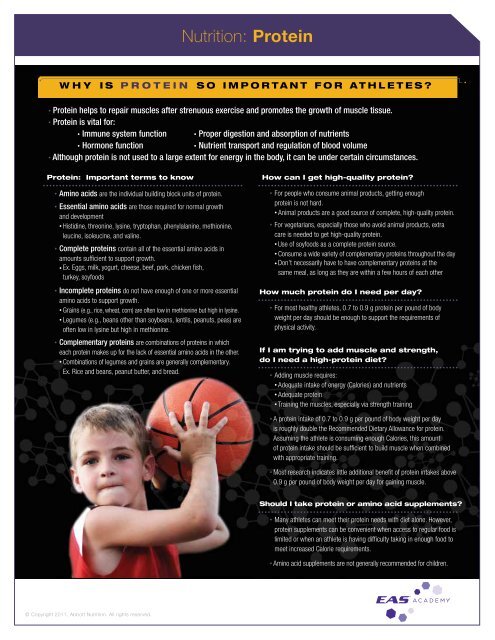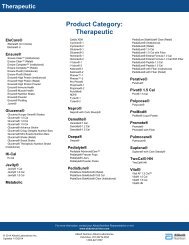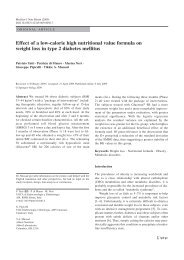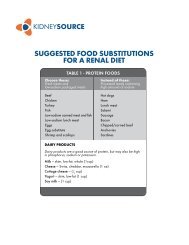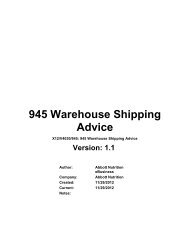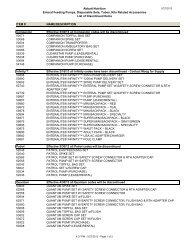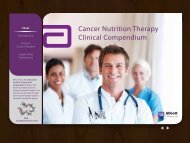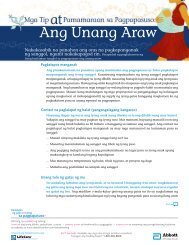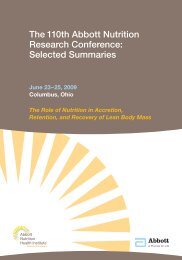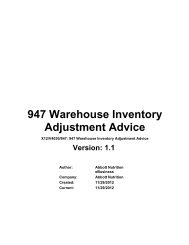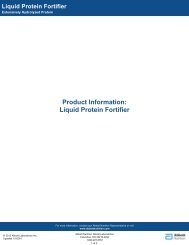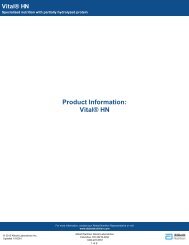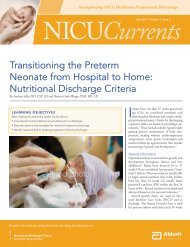Nutrition: Protein - Abbott Nutrition
Nutrition: Protein - Abbott Nutrition
Nutrition: Protein - Abbott Nutrition
Create successful ePaper yourself
Turn your PDF publications into a flip-book with our unique Google optimized e-Paper software.
<strong>Nutrition</strong>: <strong>Protein</strong><br />
W H Y i s P R O T E I N s o i m p o r t a n t f o r a t h l e t e s ?<br />
• <strong>Protein</strong> helps to repair muscles after strenuous exercise and promotes the growth of muscle tissue.<br />
• <strong>Protein</strong> is vital for:<br />
• Immune system function<br />
• Proper digestion and absorption of nutrients<br />
• Hormone function<br />
• Nutrient transport and regulation of blood volume<br />
• Although protein is not used to a large extent for energy in the body, it can be under certain circumstances.<br />
<strong>Protein</strong>: Important terms to know<br />
• Amino acids are the individual building block units of protein.<br />
• Essential amino acids are those required for normal growth<br />
and development<br />
• Histidine, threonine, lysine, tryptophan, phenylalanine, methionine,<br />
leucine, isoleucine, and valine.<br />
• Complete proteins contain all of the essential amino acids in<br />
amounts sufficient to support growth.<br />
• Ex. Eggs, milk, yogurt, cheese, beef, pork, chicken fish,<br />
turkey, soyfoods<br />
• Incomplete proteins do not have enough of one or more essential<br />
amino acids to support growth.<br />
• Grains (e.g., rice, wheat, corn) are often low in methionine but high in lysine.<br />
• Legumes (e.g., beans other than soybeans, lentils, peanuts, peas) are<br />
often low in lysine but high in methionine.<br />
• Complementary proteins are combinations of proteins in which<br />
each protein makes up for the lack of essential amino acids in the other.<br />
• Combinations of legumes and grains are generally complementary.<br />
Ex. Rice and beans, peanut butter, and bread.<br />
How can I get high-quality protein?<br />
• For people who consume animal products, getting enough<br />
protein is not hard.<br />
• Animal products are a good source of complete, high-quality protein.<br />
• For vegetarians, especially those who avoid animal products, extra<br />
care is needed to get high-quality protein.<br />
• Use of soyfoods as a complete protein source.<br />
• Consume a wide variety of complementary proteins throughout the day<br />
• Don’t necessarily have to have complementary proteins at the<br />
same meal, as long as they are within a few hours of each other<br />
How much protein do I need per day?<br />
• For most healthy athletes, 0.7 to 0.9 g protein per pound of body<br />
weight per day should be enough to support the requirements of<br />
physical activity.<br />
If I am trying to add muscle and strength,<br />
do I need a high-protein diet?<br />
• Adding muscle requires:<br />
• Adequate intake of energy (Calories) and nutrients<br />
• Adequate protein<br />
• Training the muscles, especially via strength training<br />
• A protein intake of 0.7 to 0.9 g per pound of body weight per day<br />
is roughly double the Recommended Dietary Allowance for protein.<br />
Assuming the athlete is consuming enough Calories, this amount<br />
of protein intake should be sufficient to build muscle when combined<br />
with appropriate training.<br />
• Most research indicates little additional benefit of protein intakes above<br />
0.9 g per pound of body weight per day for gaining muscle.<br />
Should I take protein or amino acid supplements?<br />
• Many athletes can meet their protein needs with diet alone. However,<br />
protein supplements can be convenient when access to regular food is<br />
limited or when an athlete is having difficulty taking in enough food to<br />
meet increased Calorie requirements.<br />
• Amino acid supplements are not generally recommended for children.<br />
®<br />
© Copyright 2011, <strong>Abbott</strong> <strong>Nutrition</strong>. All rights reserved.
<strong>Nutrition</strong>: <strong>Protein</strong><br />
Sample distribution of protein intake<br />
over several small meals per day<br />
• Here is a sample profile for a male athlete named Sam. Sam’s needs<br />
are listed below along with a sample plan for his protein intake.<br />
• Age: 14 y<br />
• Weight: 130 lbs. (61 kg)<br />
• Height: 5 feet 7 inches<br />
• Activity: Running, biking, some strength training<br />
• Duration of activity: 120 min/day (from 3-5 p.m.)<br />
• Frequency of activity: 4-5 times per week<br />
• Calorie needs: 3,400 per day<br />
• <strong>Protein</strong> need: 100 g per day (about 0.8 g per pound)<br />
Meal Time <strong>Protein</strong> (g)<br />
Breakfast 7:00 a.m. 10<br />
Mid-morning snack 10:00 a.m. 5<br />
S o u r c e s o f p r o t e i n f o r<br />
t h e m e a l p l a n<br />
• 1 egg, 2 egg whites, or 1/4 c. egg substitute = 6-7 g<br />
• 1 cup of milk = 8-10 g<br />
• 1/4 c. cottage cheese = 7 g<br />
• 1 cup of yogurt = 8 g<br />
• 1 oz. of chicken, fish, pork, or beef = 7 g<br />
(A 3-ounce portion (21 g protein) is the size of the deck of cards)<br />
• 1 oz. of cheese (except cream cheese) = 7 g<br />
• 1 slice of bread or 1/2 bagel = 3 g<br />
• 1 cup of cereal = 3-6 g<br />
• 2 T. peanut butter = 7 g<br />
• 1/2 to 2/3 cup of dried beans or lentils = 7 g<br />
• 3 T. miso = 7 g<br />
• 4 oz. raw, firm tofu = 9 g<br />
• 1/2 c. peas or corn = 3 g<br />
• 1/2 cup of non-starchy vegetables = 2 g<br />
• 8 oz. soy milk = 5-6 g<br />
• <strong>Protein</strong> drinks and powders (typically between 10-45 g/serving)<br />
Lunch Noon 15<br />
Pre-exercise meal 1:30-2:00 p.m. 5<br />
During exercise 3:00-5:00 p.m. 0<br />
Post-exercise meal 5:00 p.m. 25<br />
Dinner 6:30 p.m. 25<br />
Nighttime snack 9:00 p.m. 15<br />
TOTAL 100<br />
Timing of protein intake<br />
• The combination of protein and carbohydrate, consumed as soon as<br />
possible after exercise, is better than either protein or carbohydrate alone<br />
for promoting muscle recovery from exercise.<br />
• Some research suggests that protein intake before and during exercise<br />
can help improve amino acid availability and muscle protein synthesis<br />
in the post-workout period.<br />
®<br />
© Copyright 2011, <strong>Abbott</strong> <strong>Nutrition</strong>. All rights reserved.
© 2012 <strong>Abbott</strong> Laboratories<br />
The EAS ACADEMY website and its content is owned by <strong>Abbott</strong> <strong>Nutrition</strong>, a division of <strong>Abbott</strong><br />
Laboratories. All rights reserved.<br />
Any redistribution or reproduction of any part or all of the contents in any form is prohibited other than the<br />
following:<br />
1. you may print or download to a local hard disk extracts for your personal and non-commercial use<br />
only;<br />
2. you may copy the content to individual third parties for their personal use, but only if you<br />
acknowledge the website as the source of the material.<br />
You may not, except with our express written permission, distribute or commercially exploit the content.<br />
Nor may you transmit it or store it in any other website or other form of electronic retrieval system.


